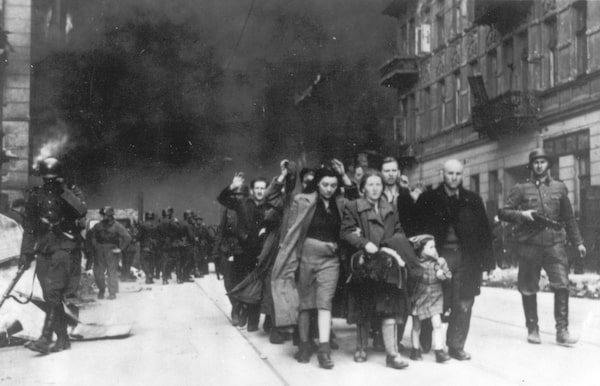
A group of Polish Jews are led away for deportation by German SS soldiers during the destruction of the Warsaw Ghetto by German troops after an uprising in the Jewish quarter in 1943.anonymous/The Associated Press
Each day the world gets a little bit less free. The latest bad news comes from Poland, where a Polish-Canadian historian is being punished for writing honestly about the Holocaust.
A Polish court has ordered University of Ottawa professor Jan Grabowski and his co-editor, Barbara Engelking, to issue a public apology for including witness testimony in a book about Poland during the Holocaust that they edited.
A witness alleged that the late Edward Malinowski helped the Nazis to locate Jews in hiding during the Second World War in German-occupied Poland. Mr. Malinowski’s 81-year-old niece sued, saying the claim was untrue. The court agreed, though it dismissed her demand that the two historians be fined.
The lawsuit was partly financed by the Polish League Against Defamation, which fights to protect the good name of Poland and its people, regardless of where the truth may lie. The league has ties to the populist Law and Justice party of President Andrzej Duda.
Prof. Grobawski and Prof. Engelking, who is director of the Polish Centre for Holocaust Research in Warsaw, are appealing the verdict. But if it is upheld, the ruling could seriously impair scholarly research on the Holocaust in Poland.
“It’s devastating,” said Irving Abella, the Canadian historian whose book None Is Too Many chronicled the plight of Jews seeking asylum in Canada during the Holocaust years. “It’s an abrogation of freedom of speech,” said the emeritus professor of history at York University. “The Polish government is telling people that, ‘We know what our history is and no one else does.’ ”
In that official version of history, Poles heroically resisted the Germans and protected Jews. Any historical research that contradicts that narrative meets resistance from the state.
Poland has become one of Eastern Europe’s illiberal democracies, in which majorities elect populist, nativist governments that then suppress freedom and oppress minorities, which means they are not really democracies at all.
“The people in Poland are divided into two big groups,” says Piotr Wrobel, who is the Konstanty Reynert Chair of Polish History at University of Toronto. “There is a category of people who are mostly young and mostly educated, who welcome the Europeanization of Poland, opening to the world, the internet, all these new elements of life. They are free.”
But “there are also people who don’t like it at all, who believe that they have the right to preserve their old culture, their old way of life, and who are ready to defend it.” This group holds sway in Poland and in some other Eastern European countries, where the courts are increasingly compromised, a free press suppressed, the rights of women and sexual minorities circumscribed.
The deterioration of freedom in Eastern Europe contributes to the steady retreat of democracy around the world.
The Economist magazine reported last week that “the average global score in the 2020 Democracy Index fell from 5.44 in 2019 to 5.37. This is by far the worst global score since the index was first produced in 2006.” The magazine noted a slide toward autocracy in Europe, southern and eastern Asia and parts of Africa and Latin America, as well as increasing loss of trust in institutions in the United States, which the magazine no longer considers a fully functioning democracy. Canada ranked fifth among countries on the index; the United States, 25th.
The news is not entirely grim. Some countries – including Taiwan, Albania, and Malawi – are showing a marked improvement in democratic freedoms. The restrictions on personal liberty forced by the pandemic will ease as populations become vaccinated. And in the United States, President Joe Biden is moving to repair the worst acts of vandalism by his predecessor, Donald Trump.
But the walls are growing higher. The globalization of equality – the right of women to be fully equal with men; the right of all ethnicities to the same treatment; the right of sexual minorities to live free of persecution – was in retreat even before the pandemic arrived, as nativist leaders played on ancient prejudices and promoted religious orthodoxy over personal freedom.
“Instead of two steps forward and one step back, it seems like it’s no steps forward and several steps back,” Prof. Abella observed.
“What do you prefer, comfort, or truth?” asked Prof. Wrobel. “Ninety-five per cent of the world population prefers comfort.” The court ruling in Poland simply offers the latest proof.
Our Morning Update and Evening Update newsletters are written by Globe editors, giving you a concise summary of the day’s most important headlines. Sign up today.
 John Ibbitson
John Ibbitson